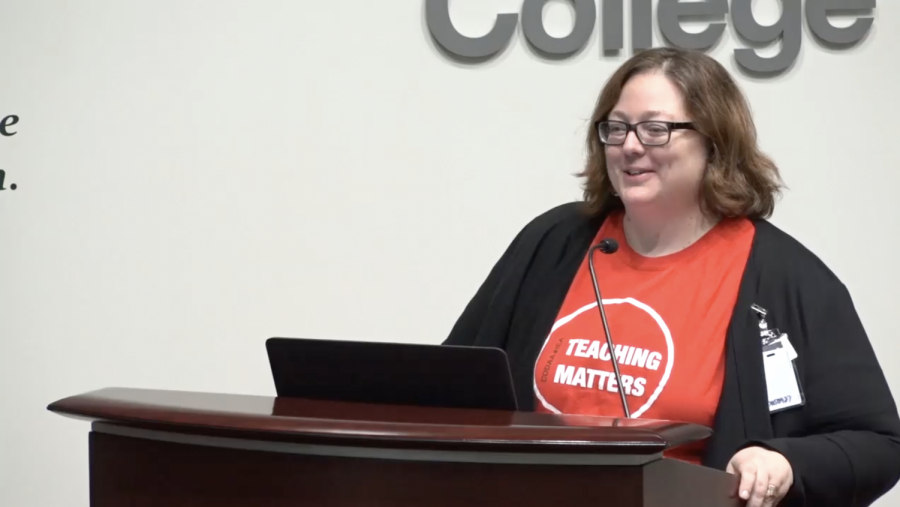Adjunct Faculty promote “Campus Equity Week”
October 30, 2019
As Bonniejean Alford, the vice president of the CODAA addressed the board of trustees in support of Campus Equity Week, she presented the reality that adjunct faculty face.
“One adjunct drove Uber for a while. Now imagine getting into your car and picking up a fare and it’s one of your students. This actually happened to one of our adjuncts,” Alford said. “They spent the rest of the semester wondering how that impacted the impression of them as a professor and role model within the discipline. They didn’t want the circumstances of their life to impact their success as an educator or their students as learners.”
Adjunct professors teach almost 60% of classes at the College of DuPage. In order to raise awareness, the College of DuPage Adjuncts Association promoted Campus Equity Week on Oct. 21- Oct. 25. Adjuncts created the national initiative to raise awareness of the unequal labor conditions they face.
According to the association, adjunct professors are not compensated for extra work done outside of the classroom.
“Adjunct faculty are paid based solely on the hours they actually spend in class teaching students,” an ad, placed in the Oct. 21 issue of The Courier read. “Adjuncts do not get paid for the work they do outside of class which includes: Preparing a syllabus, preparing tests, emailing students, creating and copying course handouts, grading and giving student feedback, ordering books and other class materials and attending professional development activities.”
Cheryl Baunbach-Caplan, the president of the union, said this past week was a good way to spread awareness, as some students may not be aware of what an adjunct professor’s job entails.
“Quite honestly [we are] hoping that students realize that not all of their instructors are full time; I think that a lot of students do not [know] that,” Baunbach-Caplan said.
In terms of the recent agreement with full-time faculty, Baunbach-Caplan has heard it will be good for both the faculty and administration.
“We’re pleased that the college and the faculty reached an agreement. A strike would have been terrible, for students and everyone. They’re very pleased they reached an agreement. From what I’ve heard, we don’t have the specifics yet, but from what I’ve heard it’s good for both sides.”
The adjunct contract will expire in 2021, and negotiations will begin in 2020. Among other things, benefits and compensation will be brought to the bargaining table.
“It’s not about equal pay; it’s about equitable pay. What we’d like to see is a comparable pay scale, for comparable work done.”
The full time faculty has already committed to supporting the Adjunct Faculty as the time nears towards negotiations.
Baunbach-Caplan hopes adjuncts will be able to have their voices heard more in department meetings and better communication from administrators.
“We do have a voice at the table for many things, but there are many things that we are still excluded from,” Baunbach-Caplan said.“Sometimes there’s still a real disconnect when decisions are made by upper administration and when we find out whether or not we have a say in anything.”
On Oct. 24, Baunbach-Caplan and Alford addressed the board of trustees at the monthly meeting. Baunbach-Caplan promoted Campus Equity Week and proposed better wages for adjuncts.
“When an employee is working a percentage of a full-time position, he or she should be paid proportionate to the full-time wage, for the duties that they are assigned. Some equities should extend to benefits such as health care,” Baunbach-Caplan said.
The maximum amount an adjunct can make at COD, even when teaching a maximum of 27 credit hours (80% of the full-time faculty load) is $32,481.
Alford said one adjunct managed earn $60,000 in one year but only by teaching at five schools and putting in 80 hours of work per week.
“This lasted only that year as they had to cut back to one school, COD, this was to ensure that their mental health didn’t collapse. Then, however, their financial health did,” Alford said. “They couldn’t always pay their bills, even ending up on public aid at one point due to class cancellations. Teaching at multiple schools is quite normal for adjuncts, as is the stress of not being able to pay their bills.”
Alford expressed that though not full time, adjuncts are educators, and do the same thing as their full-time counterparts.
“When I develop a brand new course, it brings my pay to less than $10 an hour. $10 an hour, with two masters degrees and an ABD with a PH.D. That’s not very much money at all.
As an adjunct for more than 20 years, it has been worth it but it would have been nice to have more stability and less stress about my finances along the way.”




















